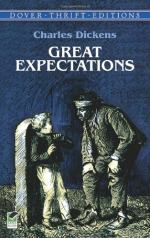A great event in my life, the turning point of my life, now opens on my view. But, before I proceed to narrate it, and before I pass on to all the changes it involved, I must give one chapter to Estella. It is not much to give to the theme that so long filled my heart.
Chapter 38
If that staid old house near the Green at Richmond should ever come to be haunted when I am dead, it will be haunted, surely, by my ghost. O the many, many nights and days through which the unquiet spirit within me haunted that house when Estella lived there! Let my body be where it would, my spirit was always wandering, wandering, wandering, about that house.
The lady with whom Estella was placed, Mrs. Brandley by name, was a widow, with one daughter several years older than Estella. The mother looked young, and the daughter looked old; the mother’s complexion was pink, and the daughter’s was yellow; the mother set up for frivolity, and the daughter for theology. They were in what is called a good position, and visited, and were visited by, numbers of people. Little, if any, community of feeling subsisted between them and Estella, but the understanding was established that they were necessary to her, and that she was necessary to them. Mrs. Brandley had been a friend of Miss Havisham’s before the time of her seclusion.
In Mrs. Brandley’s house and out of Mrs. Brandley’s house, I suffered every kind and degree of torture that Estella could cause me. The nature of my relations with her, which placed me on terms of familiarity without placing me on terms of favour, conduced to my distraction. She made use of me to tease other admirers, and she turned the very familiarity between herself and me, to the account of putting a constant slight on my devotion to her. If I had been her secretary, steward, half-brother, poor relation — if I had been a younger brother of her appointed husband — I could not have seemed to myself, further from my hopes when I was nearest to her. The privilege of calling her by her name and hearing her call me by mine, became under the circumstances an aggravation of my trials; and while I think it likely that it almost maddened her other lovers, I know too certainly that it almost maddened me.
She had admirers without end. No doubt my jealousy made an admirer of every one who went near her; but there were more than enough of them without that.
I saw her often at Richmond, I heard of her often in town, and I used often to take her and the Brandleys on the water; there were picnics, fete days, plays, operas, concerts, parties, all sorts of pleasures, through which I pursued her — and they were all miseries to me. I never had one hour’s happiness in her society, and yet my mind all round the four-and-twenty hours was harping on the happiness of having her with me unto death.
Throughout this part of our intercourse — and it lasted, as will presently be seen, for what I then thought a long time — she habitually reverted to that tone which expressed that our association was forced upon us. There were other times when she would come to a sudden check in this tone and in all her many tones, and would seem to pity me.




